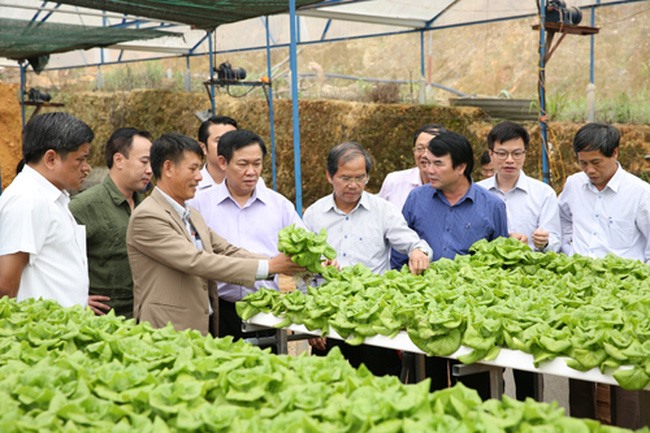 Society
Society

Deputy Minister of Agriculture and Rural Development Lê Quốc Doanh on Wednesday hailed international scientific research organisations for their contributions to Việt Nam’s agriculture development, in the context of devastating natural disasters due to climate changes.
 |
| Deputy Minister of Agriculture and Rural Development Lê Quốc Doanh on Wednesday hailed international scientific research organisations for their contributions to Việt Nam’s agriculture development, in the context of devastating natural disasters due to climate changes.— Photo VGP |
HÀ NỘI — Deputy Minister of Agriculture and Rural Development Lê Quốc Doanh on Wednesday hailed international scientific research organisations for their contributions to Việt Nam’s agriculture development, in the context of devastating natural disasters due to climate changes.
Speaking at a meeting with representatives from the Consultative Group on International Agricultural Research on Wednesday in Hà Nội, the deputy minister recognised the support from organisations including Worldfish, the International Rice Research Institute (IRRI) and the International Livestock Research Institute (ILRI) in helping the agriculture sector implement projects in fishery breeding, rice cultivation and production, and reduce the environmental risks in livestock breeding.
“One of the key solutions for the successful implementation of the agricultural sector’s restructuring goals is the application of science and technology, so the strengthening of co-operation in the field of scientific and technological research with international organisations always attracts attention from the Government and agricultural agencies,” said Doanh.
Research needs to be reformed in line with technological process and with co-operation between national and international agencies, according to the deputy minister.
Dr Bjorn Ole Sander from the IRRI said the organisation, one of Việt Nam’s most active agricultural international supporters since 1963, pledged to assist Vietnamese partners in increasing productivity, reducing inputs such as pesticides, fertilisers, water, labour and seeds and improving the quality of rice.
The scientist revealed the IRRI bank of rice genes had preserved a rich collection of natural genes, an important resources for research on rice adaptable to climate change in Việt Nam.
He also said IRRI research could help both reduce post-harvest losses and optimise supply and product quality.
Meanwhile, Dr Nguyễn Việt Hùng, Chief Representative of the ILRI in East and Southeast Asia, said the ILRI had been working with Việt Nam since 2007 in areas including
mitigating risks resulting from agricultural systematic changes, developing science and technology in animal husbandry as well as solutions for the development of animal husbandry
in connection with markets.
Hùng said currently, ILRI research was being expanded to ensure husbandry development integrated with environmental protection.
In the last few years, Doanh said, particularly last year and the first nine months of this year, the country had been suffering from continuous natural disasters including the most recent tropical depression, which caused huge damage to national agricultural production. Floods due to heavy rains hit many regions in the north and the centre of the country.
The deputy minister cited northern Hòa Bình and Nam Định povinces as typical examples of losses caused by floods, with Nam Đinh bearing the loss of a total of 50,000ha or a reduction by 100,000 tonnes of rice this year.
Despite such hardships due to impacts from natural disasters, Doanh confirmed the agricultural sector’s restructuring was moving in the right direction, reflected in its growth, added value and particularly through its export turnover.
It is estimated that the sector will reach total turnover worth US$35 billion this year, up $3 billion over the last year. It is also expect to supply jobs for about 10 million farmer households or more than 68 per cent of the population, contributing about 22 per cent of GDP to the national economy and 35 per cent to the national export value. — VNS




